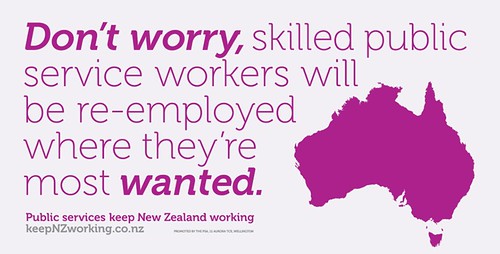Since National came to power, public service funding has been frozen, then cut, all against a backdrop of galloping inflation. The price of this has been an erosion in public service capability, as key staff have been sacked, or have moved on in search of an employer who values them. One example of this? Thanks to cuts, we can't respond to an oil spill quickly:
Two top oil spill experts who quit New Zealand for jobs in Australia have been brought back to help with the Rena crisis, prompting Opposition claims they could have prevented a five-day delay in responding to the ship's grounding.That loss of key staff cost us five days of response time - five days in which MaritimeNZ sat on its hands, and in which the consequences of the accident could have been mitigated. On a bean-counting level, that probably cost us millions of dollars of cleanup costs.[...]
Former marine pollution response manager Nick Quinn left Maritime New Zealand (MNZ) last year for a job as response manager at the Australian Marine Oil Spill centre.
Ian Niblock, who was national on-scene manager as well as the Northland regional harbour master, also left to take the harbourmaster's position in Darwin.
On October 11, Quinn took over from Rob Service as on-scene commander for the Rena crisis and Niblock replaced Alex van Wijngaarden as his deputy.
MaritimeNZ is just one example, but this issue affects the entire public sector. National have been cutting, but those cuts are a false economy. As we saw in the 90's, and are seeing now, they simply shift costs elsewhere. National have been gambling that none of those bills would come due on their watch. In the case of the Rena, they turned out to be tragically wrong.






